June 16, 2025 | 17:23 GMT +7
June 16, 2025 | 17:23 GMT +7
Hotline: 0913.378.918
June 16, 2025 | 17:23 GMT +7
Hotline: 0913.378.918
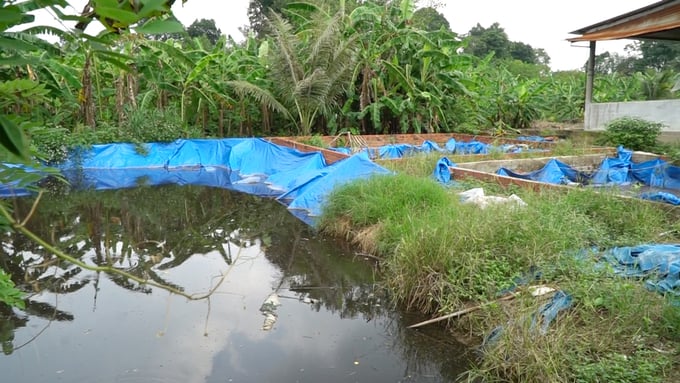
On many farms, livestock wastewater is treated in makeshift reservoirs, which give off a foul smell and pollute the environment. Photo: Le Binh.
That is the general conclusion of the Dong Nai Department of Natural Resources and Environment inspection and Thong Nhat District People's Committee when conducting a total assessment of 1,457 concentrated livestock facilities and more than 22,000 farm households.
Notably, up to 328 livestock farms with farming contracts for FDI enterprises, such as Japfa Comfeed Vietnam, CJ Vina Agri, Sunjin Vina, BAF Vietnam Agriculture Joint Stock Company, C.P. Vietnam... but still need to complete environmental procedures.
According to Mr. Tran Trong Toan, Deputy Director of the Dong Nai Department of Natural Resources and Environment, many farms have been repeatedly fined for discharging waste into the environment. The inspection team also sent notices to companies that hire livestock to be reminded, but for some reason, the incident continues.
When Vietnam Agriculture Newspaper reporters were present at a few livestock processing facilities subject to inspection, fines, and forced suspension of herd restocking, they saw the correct decision of the People's Committee of Dong Nai province.
The temporary tarpaulin-covered biogas tank system and open waste tanks are reddish-brown; even some tanks are covered with green moss, and the stench covers the entire farm area. Wastewater has overflowed into rivers and streams in many ways, causing stink and affecting all aspects of people's lives.
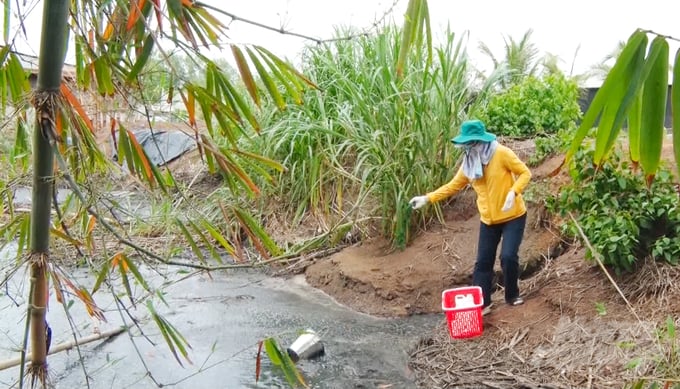
Livestock wastewater is illegally discharged into rivers and streams or spills due to rain, causing severe environmental pollution and affecting all aspects of people's lives. Photo: Le Binh.
When taking us to inspect livestock facilities in Hung Loc commune (Thong Nhat district), Mr. Bien, an officer of the Department of Natural Resources and Environment, was excited to see that the stream next to the livestock farms had become clear again. Mr. Bien said that for many years, this stream has always been persecuted by livestock wastewater, which is turbid and stinky. Now, thanks to the suspension of operations of pig farms, we have regained that clear color.
Mr. Phan Tu has raised processing pigs for CJ Vina Agri Company in Hung Loc commune for many years. Like other farms in the commune, this facility has yet to be granted environmental procedures. The farm was fined VND 50 million and forced to suspend business temporarily. To continue regenerating the herd, Mr. Tu had to borrow from the bank and invest a large amount of money to meet waste treatment requirements.
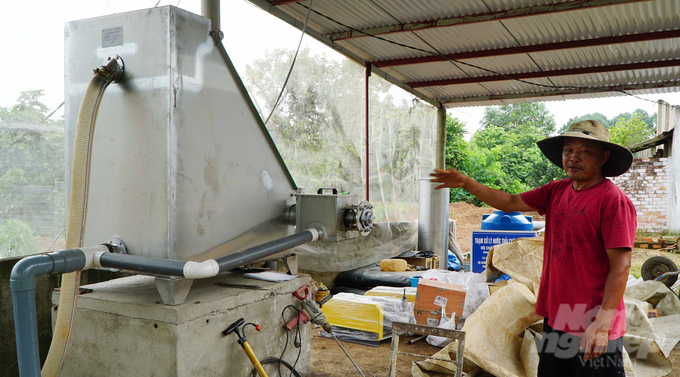
The raw manure pressing system Mr. Tu just bought is a mandatory requirement for Dong Nai authorities to evaluate whether to grant environmental procedures to allow livestock farming to resume. Photo: Le Binh.
Just like Mr. Tu, Ms. Tran Thi Thuy Van's livestock farming household and dozens of processing livestock farming households in Hung Loc commune are standing at a crossroads, needing support from their partners to continue to hold on to the profession.
"The economy is challenging now. We have stopped raising livestock for 6-7 months now. We can no longer raise livestock and are forced to pay huge amounts. In general, thanks to the company for a little support. After raising pigs and deducting expenses, we still don't have a few dollars left. We don't know what to do now that we have borrowed money and can't raise pigs," Ms. Van said earnestly.
Dong Nai's competent authorities have decided to sanction 164 establishments violating environmental protection regulations with more than VND 6.1 billion. In addition, 941 livestock facilities and households had to stop operating due to not fully meeting ecological conditions.
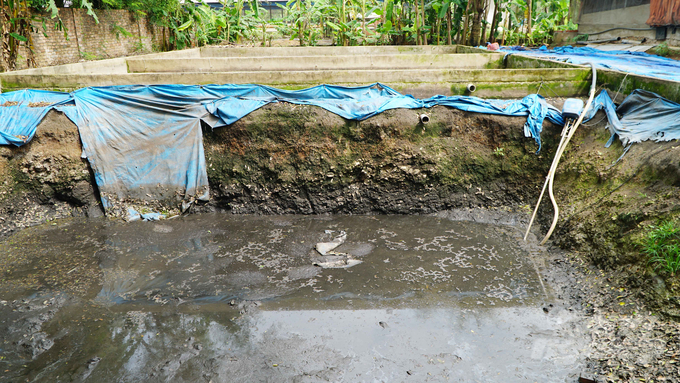
The People's Committee of Dong Nai province admitted that there is no decisiveness in handling environmental issues in livestock farming. Therefore, this work will be promoted resolutely and thoroughly in the coming time. Photo: Le Binh.
Dong Nai has developed a long-standing livestock industry with the country's most significant number of farms and herds. However, due to unstable prices and epidemics, over the years, Dong Nai people have gradually switched to outsourcing livestock farming to FDI enterprises to avoid losses.
Long Thanh and Thong Nhat districts are the two livestock "capitals" of Dong Nai province, which is also the locality with the most concentrated farms in the region, specializing in livestock farming for FDI livestock companies. All were asked to temporarily suspend business to invest in building a wastewater treatment system.
"We have worked directly with FDI enterprises that signed livestock farming contracts with these households, asking them not to let their herds go until these facilities have fixed or repaired the quality treatment systems waste. We also enforced and sealed many barns without ensuring a waste treatment system," said Mr. Nguyen Dinh Cuong, Vice Chairman of Thong Nhat District People's Committee.
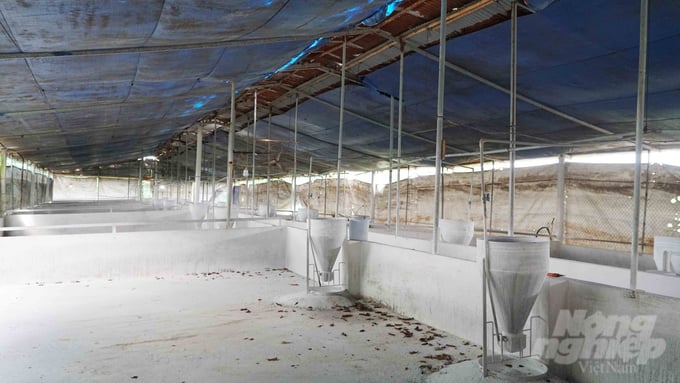
Farms suspended from restocking are forced to invest in waste treatment systems and be thoroughly evaluated before being allowed to raise livestock again. Photo: Le Binh.
In Xuan Loc district, Mr. Nguyen Van Linh, Vice Chairman of the Xuan Loc District People's Committee, shared that the authorities have also taken determined actions not to develop the economy at any cost. Accordingly, cases of direct and indirect environmental pollution will be strictly handled so that future generations can have a better life.
For businesses that hire livestock for processing, the Dong Nai Provincial People's Committee requires responsibility for farm owners to invest in barns and waste treatment systems. Thus, livestock farmers will limit violations of the law and limit risks, and businesses will have a stable, quality source of input materials.
Mr. Vo Van Phi, Vice Chairman of the Dong Nai Provincial People's Committee, said that Dong Nai's unified viewpoint is not to trade the environment for economic development. Therefore, the province will firmly handle livestock facilities that cause environmental pollution drastically, with no prohibited areas.
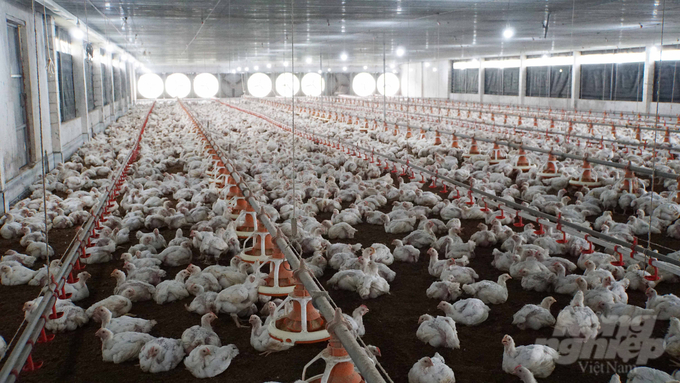
Dong Nai calls on FDI enterprises and livestock facilities to invest in cold barns and waste treatment systems that meet environmental protection criteria. Photo: Le Binh.
Not to mention, Dong Nai is fiercely implementing the goal of improving new rural areas, so ensuring the environment is a prerequisite criterion. Accordingly, developing rural tourism and attracting a comprehensive economy should not let environmental pollution hinder extensive economic development.
According to Deputy Director of Dong Nai Department of Natural Resources and Environment Tran Trong Toan, the implementation of the general inspection showed positive changes at livestock facilities. Results of surface water monitoring in rivers and streams show that surface water quality in rivers and streams in the area is gradually showing signs of improvement, showing that organic and nutrient content has decreased compared to the results in the first months of 2023. That is a clear and correct demonstration of the Dong Nai Provincial People's Committee when it wants to return purity to the environment and equality in economic development.
Translated by: Ha Phuc

(VAN) The UNESCO Global Geopark revalidation of Non nuoc Cao Bang and the transition to a two-tier administrative model are presently undergoing a pivotal moment in Cao Bang, the northernmost province of Vietnam.
/2025/06/13/5330-2-004539_953.jpg)
(VAN) Changing policy mindset and removing investment barriers are urgent requirements to open up new development space for enterprises in the agricultural sector.

(VAN) The areas include the restoration of five million hectares of marine ecosystems.

(VAN) Dr. Le Van Nguyen, Director of the Institute of E-Commerce Management (ECM), emphasizes the potential for green development through the cultivation of fruit trees, particularly in provinces such as Son La.

(VAN) VAAS and numerous Vietnamese enterprises have signed cooperation agreements with Japanese partners to promote agricultural technology and trade connectivity.
/2025/05/29/5625-12-214801_567.jpg)
(VAN) Provincial mergers in the Mekong Delta promise to streamline administration, expand inter-provincial raw material areas, and foster close linkages in agricultural value chains, benefiting both businesses and cooperatives.

(VAN) Merging Mekong Delta provinces contributes to the expansion of agricultural raw material areas, addressing previous constraints caused by provincial boundaries. Additionally, this expansion will reduce costs and strengthen linkages between businesses, cooperatives, and farmers.